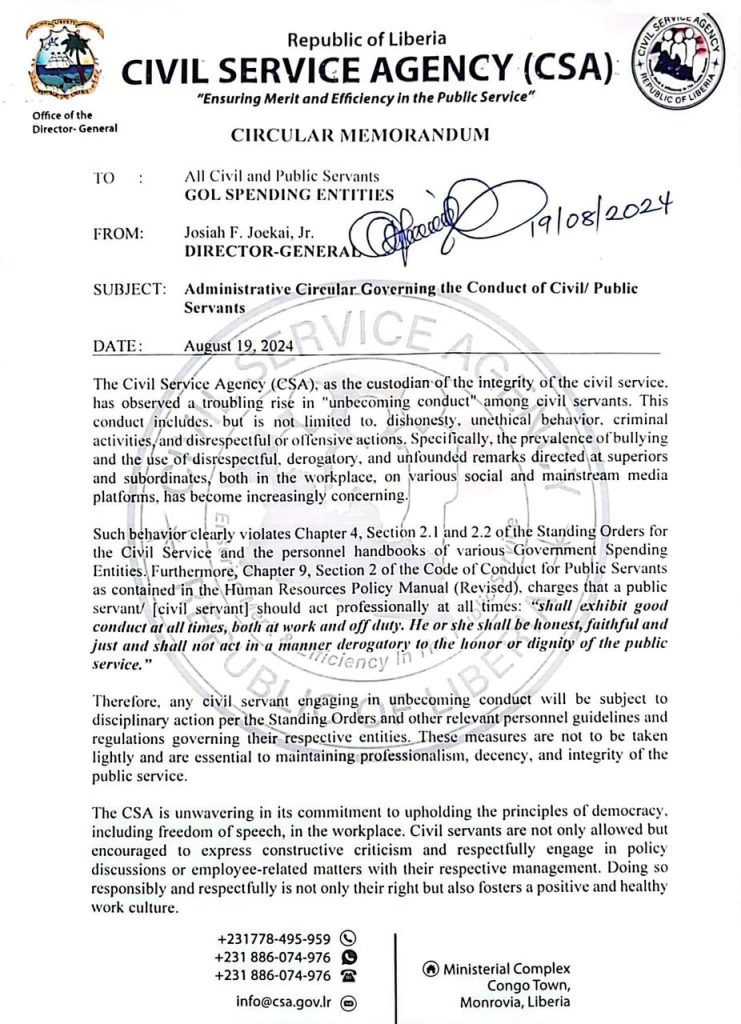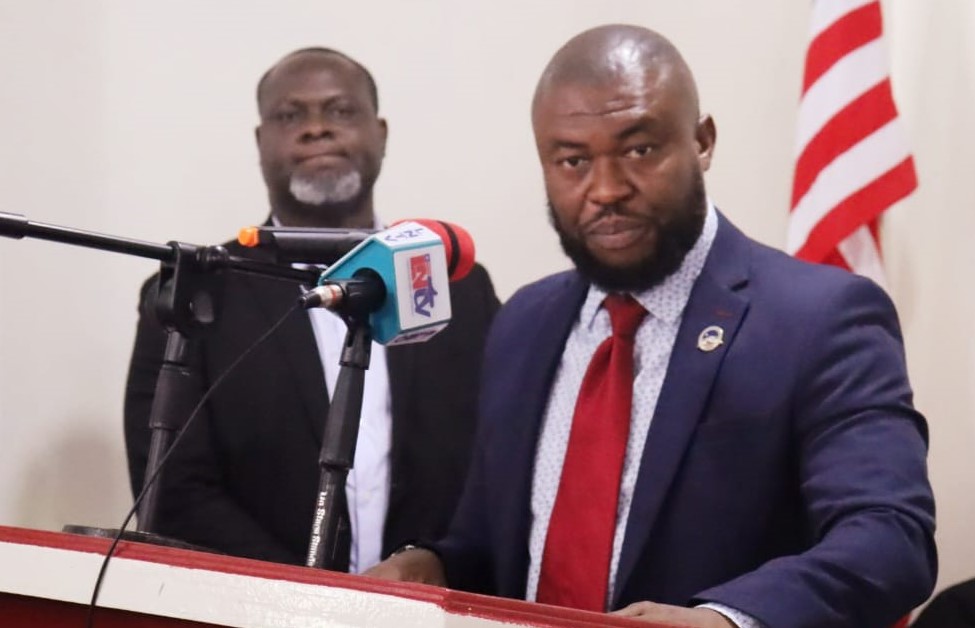Monrovia, Liberia – August 19, 2024: In a sternly worded memo issued by the Director General of the Civil Service Agency (CSA), Josiah Joekai, public and civil servants across Liberia have been warned against engaging in what the agency describes as “unbecoming conduct.” The memo outlines a range of behaviors deemed inappropriate, including dishonesty, unethical behavior, criminal activities, bullying, and the use of derogatory and disrespectful remarks, both within the workplace and on social media. However, the directive has raised concerns about potential violations of Liberia’s constitutional protections and a troubling disregard for established disciplinary procedures.
The CSA memo invokes Chapter 4, Sections 2.1 and 2.2 of the Civil Service Standing Orders and Chapter 9, Section 2 of the Code of Conduct for Public Servants to justify possible disciplinary actions against civil servants engaging in “unbecoming conduct.” According to these provisions, public servants are required to maintain good conduct at all times, both on and off duty, and must avoid any actions that could harm the dignity or honor of the public service.
While the emphasis on professionalism and ethical conduct is not surprising, the memo’s failure to adhere to the legally mandated disciplinary procedures under Liberian law has raised significant concerns. This oversight, coupled with vague language, leaves room for arbitrary enforcement and potential violations of civil servants’ constitutional rights, particularly their rights to due process, freedom of speech, and expression.
The Procedure for Disciplinary Actions under Liberian Law
Liberian law provides a clear framework for disciplinary actions against public servants, including a series of steps that must be followed to ensure fairness and transparency. This process is detailed in the Civil Service Standing Orders and the Human Resources Policy Manual, which govern the conduct and disciplinary actions within the public service.
The disciplinary procedure is typically as follows:
- Verbal Warning: The first step in addressing misconduct is usually a verbal warning. This allows the civil servant to be informed of the offense and given an opportunity to correct their behavior. This warning is meant to be a preliminary measure that encourages self-correction without immediate severe consequences.
- Written Warning: If the misconduct persists or is of a more serious nature, a written warning is issued. This warning is more formal and is recorded in the civil servant’s personnel file. It serves as a clear notice that further infractions will lead to more serious disciplinary measures.
- Suspension: Following repeated offenses or a serious breach of conduct, a civil servant may be suspended from duty. The suspension serves as both a disciplinary action and a period for investigation, allowing the CSA or the respective government entity to determine the appropriate course of action. Suspension should come after the civil servant has had a fair opportunity to respond to the allegations against them.
- Dismissal: Only after the verbal and written warnings, and where applicable, a suspension has been imposed, can dismissal be considered. Even in cases where dismissal is warranted, due process must be followed, including the civil servant’s right to appeal the decision. Under the Civil Service Standing Orders, dismissals must be based on a thorough investigation, and the decision must be reviewed by the relevant authorities to ensure it is justified and lawful.

Disregard for Due Process
The CSA memo, however, makes no mention of these legally required steps, instead implying that civil servants engaging in “unbecoming conduct” will be subject to immediate disciplinary action, which could include dismissal. This blanket approach disregards the procedural safeguards designed to protect civil servants from arbitrary or unfair punishment. By omitting the established process of verbal warnings, written warnings, and suspension before dismissal, the memo violates the basic principles of due process under Liberian law.
Article 20(a) of the Liberian Constitution guarantees every citizen the right to due process, stating: “No person shall be deprived of life, liberty, security of the person, property, privilege, or any other right except as the outcome of a hearing judgment consistent with the provisions laid down in this Constitution and in accordance with due process of law.” This protection extends to civil servants, who should not face immediate disciplinary actions, including dismissal, without the opportunity to address the charges against them through the proper channels.
Constitutional Violations
Beyond the disregard for due process, the CSA memo also raises concerns about potential violations of civil servants’ constitutional rights, particularly their rights to freedom of speech and expression as enshrined in Article 15 of the Liberian Constitution. The memo’s vague references to “unbecoming conduct” on social media and the use of “disrespectful” language could be interpreted in a way that stifles free speech, especially when such speech is critical of government actions or policies.
Article 15 guarantees every Liberian citizen, including civil servants, the right to freedom of expression, whether through speech, writing, or other mediums of communication. This right cannot be unduly restricted by vague policies that leave room for subjective interpretation and enforcement. Civil servants, like all citizens, have the right to engage in policy discussions and express their views, provided they do so within the bounds of professionalism and respect.
Amid the ongoing wave of indiscriminate dismissals of civil servants by the Boakai-led government, the CSA’s memo appears to be an attempt to legitimize its arbitrary actions under the guise of maintaining order, while undermining free speech. This comes despite Liberia’s commitments to the Table Mountain Declaration and the KAK Law, both of which decriminalized free expression in the country. Furthermore, the memo threatens freedom of association by disregarding the procedural safeguards enshrined in Liberian law. The failure to adhere to established disciplinary procedures, combined with vague language that could easily be used to stifle free speech, raises serious concerns about violations of constitutional rights.
To ensure fairness and transparency, the CSA must revise its approach to disciplinary actions. Any measures taken against civil servants should strictly adhere to the legal framework governing the public service and must respect the constitutional rights of all Liberians to due process and freedom of expression.
Liberian-born Emmanuel Orlind Cooper is an accomplished multimedia journalist with extensive experience covering news and stories on a variety of media platforms. Orlind's work frequently demonstrates his profound grasp of the region and its complexity, given his Liberian heritage.
Now residing in Woodbridge, Virginia, he keeps connecting with readers across continents with his perceptive journalism and sharing his viewpoint. He is well-respected in the sector because of his unwavering commitment to honesty and morality, which sets him apart in the field.
Orlind's work is more than simply his job; it's a dedication to giving voice to the voiceless, illuminating unsung tales, and advancing the worldwide conversation on important concerns. His goal as a journalist is to use the media's power to change the world, not just to disseminate information. He is a key player in modern journalism because of the inspiration, education, and engagement that his work consistently provides.


